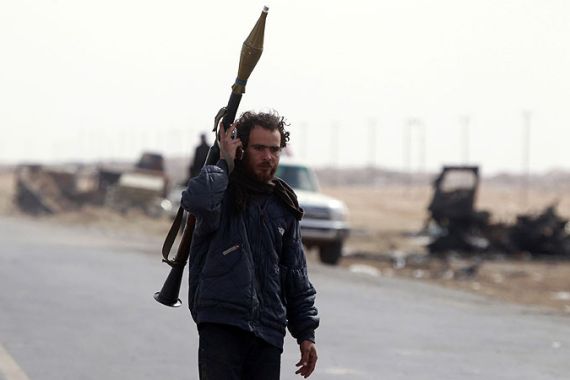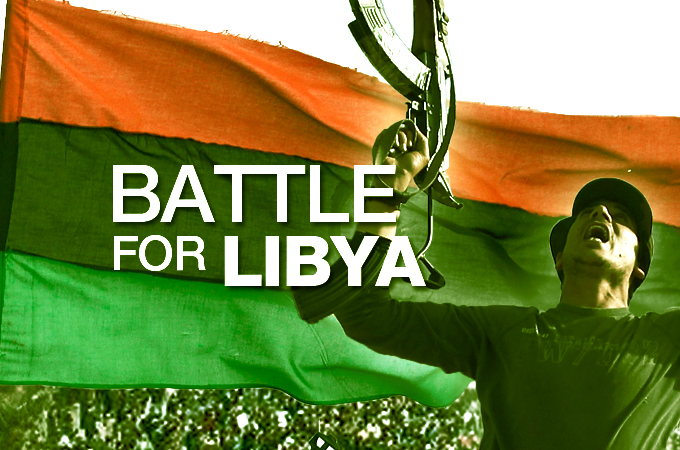UN chief appeals for end to Libya killing
Ban Ki-moon’s plea comes as concern mounts over crisis in Misurata and Obama approves use of armed Predator drones.

 |
| As the battle for Libya rages on, the rebels have called for international troops to help defeat Gaddafi [GALLO/GETTY] |
Casualties are on the rise as Libyan government forces and rebel fighters battle it out on the streets of besieged western city of Misurata, amid calls by the UN chief to “stop fighting”.
Ban Ki-moon, the UN secretary-general, urged Libyan authorities on Thursday to “stop fighting and stop killing people” and said the world body’s priority was to secure a ceasefire.
“At this time our priority is to bring about a verifiable and effective ceasefire, and then we can expand our humanitarian assistance, and we are going to engage in political dialogue,” he said during an official visit to Moscow.
 |
| Keep up with all the latest developments here |
Meanwhile, in Washington the US defence secretary told the Reuters news agency that the US president had approved use of armed Predator drones in Libya, and that missions involving the unmanned aircraft were set to begin.
The Libyan rebels have been trying since mid-February to end Muammar Gaddafi’s 41-year-old rule but have struggled against his more experienced and better equipped forces.
International forces have been carrying out air raids on forces loyal to Gaddafi since March 19, in a mission headed by NATO since March 31.
The NATO-led coalition is enforcing a UN mandated no-fly zone in Libya, which authorises “all necessary measures” to protect civilians from attack by Gaddafi’s forces.
Border post captured
Earlier on Thursday, pro-democracy fighters took control of the Libyan side of a key border crossing with Tunisia, in a remote western region.
Witnesses said pro-Gaddafi forces abandoned their weapons and fled into Tunisia.
 |
| Click on image for comprehensive coverage on Libya |
Sue Turton, Al Jazeera’s correspondent in Benghazi, said there was fierce fighting before the rebels were able to seize control of the post.
“The post … has some 6,000 Libyans trying to get into Tunisia trying to flee the fighting here. People are camped out there,” she said.
“We’re also hearing from the national council here that this isn’t the first time that they’ve taken control of that outpost. They’re just watching to see whether Gaddafi forces strike back and try to take the post back again.”
Elsewhere in the country, Libyan state television said, NATO forces struck the Khallat al-Farjan area of the capital Tripoli, killing seven people and wounding 18 others.
The report could not immediately be independently verified.
But NATO denied that any air raid had killed civilians, saying the target was a command and control bunker in a military compound.
The developments came on a day forces loyal to Gaddafi rained mortar fire on Misurata, the only rebel stronghold in the country’s west where fighting has trapped 300,000 residents.
Medics said they have seen children with shrapnel and bullet wounds, with snipers allegedly killing and causing terror among the residents.
Misurata’s plight
Food and water are hard to be found and the hospitals are totally overwhelmed in Misurata.
Many residents have been forced to flee.
|
Shashank Joshi, a security analyst, talks to Al Jazeera on the situation in Libya |
Up to 50 or 60 people … are being injured per day,” Mohammed Al Fagieh, chief surgeon at a hospital in Misurata, told Al Jazeera.
“I’m talking about the hospital, I’m not talking about Misurata. The number might double or triple sometimes.”
Moussa Ibrahim, the Libyan government spokesman, said Gaddafi’s forces control more than 80 per cent of Misurata and the rebels hold “the sea port and the area surrounding it”.
“Among the casualties of the fighting in the city are Western journalists Chris Hondros and Tim Hetherington, both photojournalists, who died in a mortar attack on Wednesday.
Ibrahim said Libyan troops were not to blame for their deaths of the two photographers.
“We are very sad for the loss of any human life even from the rebel side, so we’re really sad for the loss of these two lives,” he said. “It’s not the responsibility of our army.”
As reports of the humanitarian crisis in Misurata poured in, Hillary Clinton, the US secretary of state, accused Gaddafi’s troops of continuing their “vicious attacks”.
“Colonel Gaddafi’s troops continue their vicious attacks including the siege of Misurata. There are even reports that Gaddafi forces may have used cluster bombs against their own people,” she said on Thursday.
Signs of war crimes
The UN has said it is looking for signs of war crimes in Libya. The Gaddafi government has strenuously denied attacking civilians in Misurata.
|
|
Valerie Amos, the UN humanitarian chief, said the situation has not yet reached the point where the UN needs NATO troops to secure humanitarian supplies in the country.
“At the moment, we have an agreement with the European force and with NATO that should we reach a point where the utilisation of civilian assets becomes impossible because of the security situation, we, the UN, would call on them for support for military assets,” she said.
Al Jazeera’s Sue Turton said many Libyans are looking abroad to see when international help will come.
“There has been talk of possibly foreign troops on the ground. Whether or not foreign troops are allowed on this soil is still a matter of contention. I’ve been told by the [rebel] Libyan Transitional National Council that maybe those troops could be provided by some of the Arab countries rather than the European countries.”
David Cameron, the British prime minister, insisted on Thursday that NATO was not edging towards deployment of ground troops in Libya despite the recent decision by several European nations to send military advisers to assist rebel forces.
“The UN Security Council does limit us. We’re not allowed, rightly, to have an invading army, or an occupying army,” he told BBC Scotland radio.
Russia said the sending of advisers exceeded the Security Council mandate to protect civilians.
“We are not happy about the latest events in Libya, which are pulling the international community into a conflict on the ground. This may have unpredictable consequences,” Sergei Lavrov, the Russian foreign minister, said.